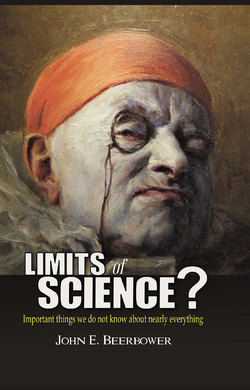Читать книгу Limits of Science? - John E. Beerbower - Страница 29
На сайте Литреса книга снята с продажи.
Science and advocacy
ОглавлениеTo round-out this discussion, I would like to make another observation about scientists and scientific progress. There is a common assertion, in various formulations, to the effect that faith is belief despite the facts, science is belief because of the facts. Like many such sayings, it sounds wise and insightful but does not withstand scrutiny. One need only look at the emotional attacks by scientists on faith to see that more than objective rationality is involved. In addition, if one looks at scientists’ efforts to defend and protect their own theories from conflicting evidence and criticism, it is often apparent that the scientists are not behaving as strictly objective, rational truth-seekers. Is that a problem? I think not, as long as one sees what is transpiring and is not misled by claims of special expertise and superior knowledge or experience.
In fact, we have models in the modern Western tradition that suggest that biased advocacy, in contrast to neutral investigation, can be a powerful tool for the discovery of truth. The more general case suggests that the process will work only if there is a relative balance of biases across interested groups and that there is some open-mindedness to criticism among at least some parties to the debate. See, e.g., John Stuart Mill, On Liberty (1859), Chapter 2. That is the model that Popper and Lipton and many others seem to have had in mind for the proper scientific process. And, that model has been criticized by various others as naïve and misleading when applied to real life experiences.
However, the Anglo-American legal tradition is based in part on the belief that interested parties aggressively advancing their individual interests in an adversarial process before a passive finder of fact can dispel the false and distill the truth on average more effectively than a magisterial process in which the investigation is initiated and directed by an investigative official seeking to discover the truth. The assumption is that the best and most creative arguments, the most probing and effective investigations and the most damaging and incisive challenges are more likely to be inspired by self-interest than by good intentions. Thus, there are potential benefits from having self-interested scientists, motivated by the promotion of their own ideas and own personal success. The corrective forces arise from the competing self-interests of other scientists. The vigorous competition among ideas (and theories) implemented and fueled by the personal competition among the individual participants may be expected to bring about more rapid scientific progress. At the same time, it is highly beneficial for the process to have some reference to the goals of objectivity, peer-group review, empirical testing, etc.
Of course, the parallels to the arguments of free market advocates in economic policy are obvious. So also is the relevance of the question of whether some external regulation (for example, against fraud or misrepresentation) is needed to promote the proper functioning of the marketplace for ideas as well as the marketplace for goods and services.
But, the underlying point is the benefit of competition. As only one of many possible examples, in a famous dissenting opinion addressing the First Amendment of the U.S. Constitution in an appeal to the U.S. Supreme Court of a conviction during the First World War of a political radical for publishing a leaflet opposing U.S. involvement in revolutionary Russia, Justice Oliver Wendell Holmes wrote that the “ultimate good desired is better reached by free trade in ideas—that the best test of truth is the power of the thought to get itself accepted in the competition of the market.” Abrams v. United States, November 10, 1919. The market analogy was clearly already powerful in the early twentieth century.
